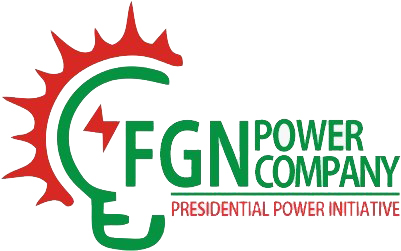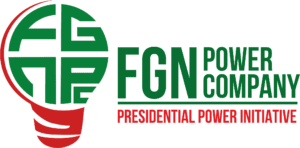Frequently Asked Questions
- Home
- Frequently Asked Questions
- The FGN Power Company (FGNPC) is the Special Purpose Vehicle (SPV) to secure financing,effectively coordinate stakeholders and enter into efficient commercial and contractual arrangements to deliver the Presidential Power Initiative (PPI) mandate.
The FGNPC was established as a special purpose vehicle to serve as a central command hub for the goals of the presidential power initiative (PPI).
The PPI was conceived from a meeting on August 31, 2018 between President Muhammadu Buhari and German Chancellor Angela Merkel.The PPI will be implemented in three-phases with the goal to modernize and expand the power grid (generation, transmission and distribution).
- Phase 1 focuses on “quick-win” measures to increase operational capacity to 7 GW end-to-end.
- Phase 2 aims to increase the capacity of the transmission and distribution systems to allow for evacuation of up to 11 GW of electricity to end-users.
- Phase 3 aims to increase the capacity of the power grid to 25 GW by expanding generation, systems of transmission and distribution
According to the schematic framework of the PPI, the project’s lifespan is Five (5) years. The initiative was first established in 2020 and is expected to produce conclusive results by 2025.
Siemens energy has a global track record, as one of the most technologically advanced power infrastructure developers to ensure the PPI equipment meets the highest possible standards so that millions of people across Nigeria are provided with better access to stable and reliable energy. Also, 85% of the funding for the PPI is sourced from the German government thus resulting in Siemens selection as the implementing partner for the PPI.
This intervention is a unique end-to-end approach, which will upgrade power generation, transmission and distribution to resolve critical issues in the power sector.
FGNPC provides thorough oversight, stakeholder’s coordination, secure financing and enter into efficient commercial and contractual arrangements for the project on behalf of the Federal Government of Nigeria to ensure project cohesion and seamless implementation of the PPI.
Power is generated from the power plant, which is normally either gas-fired or hydroelectric in Nigeria; it is then transported at very high voltage through wires supported by big tall steel towers. When those lines reach a population center, there is a major substation, which reduces the voltage to a safer level. This is then transmitted to local community substations where the voltage is reduced for distribution to end-users.
The two (2) 60 MVA 132/33 KV transformers will improve service and availability to over 10,000 homes and businesses in Abuja (FCT) and Lagos respectively. The PPI will play a pivotal role, toward both ends, particularly as we move into our second and third phases. It is important because of the immediate to long-term impact. The PPI will have also have a positive people-side impact as we deliver greater energy throughput to customers.
The financing for the offshore will be obtained at a reduced rate from German banks and guaranteed by Euler Hermes (German Export Credit Agency).
The loan from German banks will fund 85% of the offshore project cost, with the FGN Power Company providing the remaining 15%. The FGN Power Company will then on-lend the project cost to the DisCos and Transmission Company of Nigeria (TCN), with repayment coming from the beneficiaries’ market revenue
The completion of the PPI will benefit Nigeria significantly because it will result in improved power supply throughout the country. As a result of this development, businesses and industries will experience massive growth, which will boost the Nigerian economy. Power supply, as in most advanced parts of the world, is the dominant factor governing social and industrial development.
The transformers procured under the PPI, which are manufactured by Siemens using cutting edge technology, are expected to last well-over fifty years, with adequate maintenance.
Siemens will provide expertise to Nigerian technical experts on maintenance and subsequent preservation of all distribution and transmission infrastructure it has put in place.
The PPI contains a significant amount of local content. Nigerian companies and local contractors carry out a huge portion of construction work on the project. Also, offshore experts who mentor and train Nigerians oversee the most specialized technical components of substation construction.
A significant and robust training regime is already underway as part of sustainability plans and capacity building under the PPI. The power systems simulations and planning training (PTI) has trained over 200 Nigerian engineers so far with the target to train 5,000 engineers across public and private organizations at the end of the project. In terms of equipment, the PPI encourages offshore contractors to use local firms to manufacture poles, hardware, cable, and even transformers in Nigeria.
In addition to increased power generation and transmission, a network metering management system will be implemented. There will be an extensive rehabilitation of transmission and distribution lines. As the PPI progresses, a Meter Data Management System (MDMS) will be established to monitor power consumption throughout the country. Furthermore, 200 Nigerians have been trained so far on network development studies under Siemens in order to advance the Nigeria electricity road map. By the end of the program, 5000 Nigerian engineers would have been trained as a sustainability structure for the projects under the PPI.
The entire power generation and distribution infrastructure of Siemens Energy is designed to avoid carbon emissions, thereby safeguarding the environment from the greenhouse effect and other potential pollution.
The FGNPC works in tandem with the aforementioned bodies in a very unique way. They are all critical stakeholders working to deliver the PPI’s mandate. To successfully deliver on the PPI, it is important for FGNPC to ensure cohesion and alignment with and amongst the key players in the sector in order to achieve the ultimate goal, to improve and resolve bottlenecks in the power sector.
Ground Floor, Niger Delta Power Holding (NDPHC) Building
1490, Samuel Ademulegun Avenue
CBD, Abuja, Nigeria

